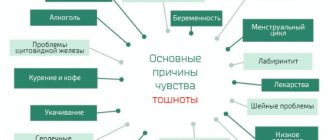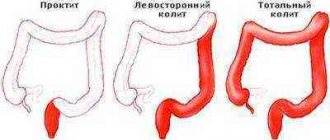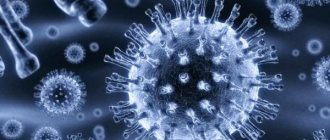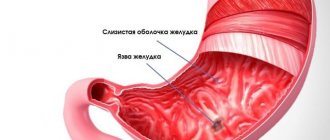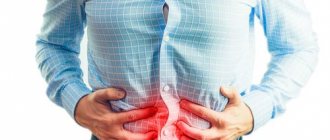Nausea, dizziness, weakness and abdominal pain can have a variety of causes. Ignoring symptoms can lead to serious consequences. It is necessary to determine the cause of the ailment and assess the general condition of the patient.
If poor health is caused by overwork, stress or weather changes, you can get by with treatment at home. Medical intervention is necessary if serious chronic or infectious diseases are suspected. Also when the patient’s condition rapidly deteriorates.
Causes
In most cases, these symptoms are signs of poisoning, viral, infectious or chronic diseases. They can also occur for physiological reasons.
Poisoning
Food poisoning is the most common. They arise due to the consumption of low-quality or expired products, inedible mushrooms, alcohol abuse, and improper use of medications.
The distinctive features of food poisoning are:
abdominal pain, heaviness; nausea, vomiting; stomach upset; severe weakness; drowsiness; feeling of disgust for food; dizziness; heat; chills.
In most cases, the pain spreads throughout the entire abdominal cavity. The nature depends on the degree of poisoning. It can be either aching, pressing, or sharp, cramping. Crashes occur with severe poisoning. It is necessary to call an ambulance, as gastric lavage may be necessary.
Poisoning can be stopped at the initial stage. If there is a suspicion that the product consumed has been spoiled or a slight malaise has occurred, it is necessary to take activated charcoal. You should refuse food for at least a few hours.
Alcohol
Alcohol poisoning has the same symptoms as food poisoning. In addition, there may be pain in the right hypochondrium, increased heart rate, decreased blood pressure, and increased sweating. Red spots also appear on the skin.
If there are symptoms of intoxication, you need to induce vomiting and start taking absorbents. You should avoid eating and drink plenty of water, especially hot tea. If it doesn't get better, seek help from a specialist.
Mushrooms
Mushroom intoxication is especially dangerous because it can be fatal. In severe cases, convulsions, loss of coordination of movements, hallucinations, and loss of consciousness are observed.
Treatment is difficult to carry out at home, so hospitalization is required. First aid consists of taking absorbents and gastric lavage. If there is no diarrhea, you should take a laxative.
Medicines
Drug poisoning occurs for many reasons:
improper use; overdose; use after expiration date; improper storage; poor quality; incompatibility of drugs; suicide attempt; accessibility for children.
Weakness, lethargy, drowsiness, general malaise, rapid heartbeat or pulse, and lack of response to stimuli (pain, light) are observed. Loss of consciousness may occur.
An adult should drink five glasses of warm water. Dosage for children is calculated based on age. For every year of life there is 100 ml of water. It is necessary to induce vomiting and rinse the stomach until it is cleared. Also take five tablets of crushed activated carbon with water.
Non-food products
This group includes dyes, household chemicals, cleaning products, detergents, office supplies, building materials and much more. Many of them are toxic.
Poisoning occurs:
if swallowed; by inhalation; when accumulating in the body; upon contact with the mucous membrane.
The distinctive features of the malaise include:
severe and sometimes pressing headache; cough; dyspnea; disturbance of consciousness; excessive salivation; tearfulness; foam at mouth; temporary impairment or loss of vision; heart rhythm disturbance; difficulty breathing; lethargy; apathy.
It is difficult to cope with chemical poisoning on your own. It is necessary to call a doctor and consult a specialist about first aid. It is necessary to describe in detail the patient’s condition and all the signs that have appeared. Also clarify what exactly caused the poisoning.
To relieve symptoms, drink plenty of water in small portions. It is forbidden to induce vomiting. Vomit may contain chemicals that can cause burns. They can also get into the lungs.
In case of acid and alkali poisoning, rinsing is prohibited. Vomiting may become worse and may interfere with breathing. You need to drink no more than 600 ml of water. In case of acid poisoning, water is diluted with a small amount of soda, in case of alkali intoxication - with citric or acetic acid. You should get a 2-3% solution. Take a tablespoon every five minutes.
Viral and infectious diseases
They differ in the location of pain, the nature of the pain syndrome, symptoms and methods of treatment.
Viral or intestinal flu
Most often occurs in children and the elderly. In adults with good immunity, it can occur without external signs. If your child gets sick, you should definitely call a pediatrician. He will determine whether hospitalization is needed or not and prescribe treatment.
There are only a few ways of transmitting the virus:
food (unwashed fruits and vegetables, low-quality dairy products, raw tap water, dirty hands, etc.); airborne (talking, sneezing, coughing, etc.); contact and household (places of large gatherings of people).
The main symptoms of intestinal flu are:
sore throat when swallowing; dull pain in the neck and back of the head; redness and inflammation of the throat; loose stools up to 5-10 times a day; slight runny nose and cough; periodic sharp pain in the stomach, especially in the upper part; rumbling; increased body temperature; redness of the eye membranes; nausea, vomiting; dehydration; weakness; malaise; slight dizziness.
The main treatment involves taking medications that lower the temperature and combat stomach upset. You also need to drink activated carbon or other sorbents.
For a while you will have to give up foods that weaken you and stick to a diet. It is strictly forbidden to consume dairy and fermented milk products. They provoke the growth of pathogenic organisms in the intestines.
Upon completion of treatment, it is necessary to restore the intestinal microflora with the help of probiotic preparations.
Meningitis
Meningitis is an inflammation of the spinal cord and brain. A rather dangerous disease that requires urgent hospitalization. Treatment is carried out exclusively in a hospital. Most often occurs in children.
Methods of transmission of meningitis:
The most common method is airborne. A child can acquire microorganisms that cause meningitis from the mother during childbirth. The mother may simply be a carrier of the disease. Children who are born through surgery are at risk. Children who neglect to wash their hands after using the toilet, walking, or playing with animals are susceptible to oral-fecal transmission. Transmitted through food and water contaminated by rodents. Through the bites of insects that are carriers.
During meningitis the following is observed:
temperature increase; chills; seizures headache; rash on the skin or on the back of the throat; conjunctivitis; nausea, vomiting; loss of appetite; intolerance to light and sounds; low blood pressure; lower abdominal pain; increased heart rate; thirst; hallucinations; apathy; pain when tapping on the skull; Difficulty bending the head and straightening bent legs.
In some cases, ARVI begins a few days before meningitis. Most often in infants.
If symptoms of meningitis appear, consult a doctor immediately. First aid is provided by a specialist, based on the initial signs. The treatment is carried out by an infectious disease specialist and a neurologist.
Chronic diseases
Nausea, dizziness, weakness, and abdominal pain can occur against the background of chronic diseases of the kidneys, heart, thyroid gland, and stomach.
Kidney inflammation
Symptoms appear within two days. If the kidneys are cold, the following is observed:
lower back pain; nagging pain in the lower abdomen on the left side; urinary disturbance; blood, sand, salts in the urine; swelling of the limbs; chills; temperature rise to 39-40 degrees; the appearance of a rash on the skin.
There are four causes of the disease:
hypothermia; infectious diseases of the bacterial type (influenza, scarlet fever, tonsillitis and others); viruses that penetrate the blood (Escherichia coli, staphylococci and others); taking a large number of medications.
It is necessary to take a urine test and start taking medications prescribed by your doctor. As a rule, a complex of medications is prescribed, including diuretics and antibiotics.
If measures are not taken at the initial stage, diseases such as pyelonephritis, pyelitis, glomerulonephritis may develop. In this case, treatment will be more complex and a full medical examination will be required to determine an accurate diagnosis.
Hypothyroidism
Thyroid dysfunction. It consists of insufficient hormone secretion. Most often occurs in women over 50 years of age. The main symptoms are nausea, weakness, flatulence, swelling of the extremities, abdominal pain, weight gain, decreased blood pressure, and menstrual irregularities.
The disease is diagnosed by an endocrinologist. Laboratory and instrumental examinations are carried out. Treatment is quite long and can take from several months to several years. In some cases, you have to take medications for life.
Stomach ulcer
Defect in the gastric mucosa. Men aged 20-50 years are most susceptible. The disease is accompanied by pain, which worsens in the spring and autumn. The nature of the pain can be of any kind. Soreness most often occurs in the center of the abdomen, the navel area, but can occur in the upper part or in the left and right hypochondrium.
Other signs of the disease are heartburn, nausea and vomiting, loss of appetite, bloating, a feeling of heaviness, diarrhea, weakness, and blood in the stool. The diagnosis is made based on a blood test, gastroscopy and other examinations prescribed by a doctor.
Complex treatment and a strict diet are required. You should not eat spicy, salty and fried foods, spices, fatty meats, smoked foods, canned food, baked goods, strong tea and coffee, and carbonated drinks.
Physiological reasons
Unpleasant sensations may occur during menstruation. If you are concerned about acute pain that lasts several days, or nausea or vomiting, you should consult a doctor. Nagging pain usually lasts the first few days of the menstrual period. They can be relieved at home with a gentle massage, a heating pad or a warm shower.
Nausea, dizziness, weakness, nagging pain in the abdomen may indicate pregnancy. However, acute pain may indicate a disorder. You should immediately contact your attending gynecologist who monitors the development of pregnancy, or call an ambulance.
First aid
You should definitely call a doctor if you have acute pain, severe weakness, rapid deterioration of your condition, or suspected chronic or infectious diseases. In other cases, you can try to cope with the symptoms on your own. However, these signs cannot be ignored. You need to visit a doctor to understand what caused the illness.
Relieving stress, temporarily refusing food, drinking water, and taking absorbents help alleviate the condition during poisoning and problems with the gastrointestinal tract. First of all, you should avoid irritating foods. If there is no improvement or other symptoms appear, you should consult a specialist.
Herbal teas, decoctions of chamomile, nettle, and mint help reduce menstrual pain. You can also take a warm shower. Bed rest will ease the condition. The fetal position is considered the most optimal.
You should not try to diagnose yourself and take medications, especially antibiotics. Completely different diseases can have similar symptoms. Taking medications inappropriately can significantly worsen the condition or lead to more serious consequences.
Do you still think that healing your stomach and intestines is difficult?
Judging by the fact that you are now reading these lines, victory in the fight against diseases of the gastrointestinal tract is not yet on your side...
Have you already thought about surgery? This is understandable, because the stomach is a very important organ, and its proper functioning is the key to health and well-being. Frequent abdominal pain, heartburn, bloating, belching, nausea, bowel dysfunction... All these symptoms are familiar to you firsthand.
But perhaps it would be more correct to treat not the effect, but the cause? Here is the story of Galina Savina, about how she got rid of all these unpleasant symptoms... Read the article >>>
When dizziness and abdominal pain occur simultaneously, this is a very unpleasant condition. The slightest signs of illness make some people rush to the doctors for help, while others patiently wait until it goes away on its own. Who is doing the right thing? Is the simultaneous manifestation of symptoms such as stomach pain and dizziness dangerous for health or is it a mild disorder? Such signs clearly indicate the presence of problems in the body, but the necessary examinations will show how serious they are.
Causes
If your stomach hurts and you feel dizzy, then you are probably poisoned. This is confirmed by dilated pupils and problems with swallowing. It happens that the upper eyelid droops. But such symptoms also occur with appendicitis, strangulated hernia and perforated ulcer.
Dizziness and pain in the lower abdomen in women can be a sign of pregnancy. But if the pain is severe, the pregnancy is ectopic with a ruptured tube. The pain is sudden and sharp. It is given to the bladder and rectum. Vomiting, cold sweat, and clouding of consciousness occur.
If such a condition occurs, dangerous diseases cannot be ruled out:
peritonitis, peritoneal abscess, bleeding in the stomach, hepatic encephalopathy.
Abdominal pain accompanied by dizziness is considered dangerous to health and even life, so you should urgently seek medical help.
Viral poisoning
All infectious and many viral diseases cause pain in the abdomen and head. And the main “culprit” is considered to be rotavirus or stomach flu. The virus enters the body through contaminated foods and affects the patient’s gastrointestinal tract. Excreted in feces.
Main signs of the disease:
weakness, dizziness, abdominal pain, diarrhea, vomiting, fever.
A person begins to recover on the fifth day from the onset of the illness.
Food poisoning
The simultaneous occurrence of abdominal pain and severe dizziness is sometimes caused by bacterial toxins. They activate toxic infections that are found in low-quality products. The causative agents are:
staphylococci, clostridia botulism, clostridia toxins.
After exposure to staphylococci, the following conditions are observed:
dull pain in the head, gagging, stomach pain, decreased blood pressure, severe attacks of dizziness, coldness in the extremities, blurred vision.
This poisoning differs in that when the symptoms are severe, the body quickly returns to its normal state. If the poisoning is very severe, then dizziness lasts for two days.
The situation is most difficult if a person has been poisoned by clostridia toxins. First of all, acute pain appears in the navel area, then dizziness begins, nausea and prolonged diarrhea occur.
Getting botulism toxins into the body is very dangerous. They can be found in fish and canned food. The patient has unbearable pain in the head and abdominal area, diarrhea and frequent bouts of vomiting.
Drug poisoning
Few people know that weakness, nausea, severe dizziness and abdominal pain can occur from taking regular ascorbic acid. Everyone knows that ascorbic acid contains vitamin C, which plays an important role in all active processes of the body and protects it from the effects of free radicals. The supply of this vitamin must be replenished as the body produces it.
This drug should be used carefully and in the prescribed dosage, otherwise dizziness and nausea will occur.
Excessive use of any drug leads to poisoning and this useful acid is no exception.
Poisoning occurs in the following cases:
in the spring the body is weakened and cannot cope with an overdose of acid; if ascorbic acid is consumed simultaneously with fruits that are high in vitamin C; excessive consumption for preventive purposes against weakness and dizziness.
This poisoning during pregnancy is fraught with serious consequences.
The first symptoms appear in the form of severe dizziness, stomach pain, headache and severe vomiting. No one associates these symptoms with excessive intake of ascorbic acid. By the way, the later an overdose is detected, the worse it is for the body.
If there is a problem with the adrenal glands, then intoxication will cause an exacerbation with sharp pain.
Such poisoning is considered not very dangerous, and treatment consists of discontinuing this acid. First, the nausea will disappear, and then the painful sensations in the stomach and dizziness.
Toxic infection
The reason why a person simultaneously has a headache, a stomach ache and at the same time feels sick can be a toxic infection. Disease provocateurs can be staphylococcus, salmonella, clostridia and botulism.
Staphylococcal infections
Signs of the disease are few, but characteristic. This:
- abdominal pain localized in the epigastric region;
- attacks of nausea and vomiting;
- a significant decrease in blood pressure, which causes the development of headaches.
The acute period of infection with staphylococci lasts no more than a day. Then the patient's general condition stabilizes. But over the next few days he feels general weakness and feels dizzy. The basis of treatment of the disease is the suppression of the vital processes of staphylococci. For this purpose, drugs from the antibiotic category (penicillin group) are often used.
Clostridia
Infection with clostridia occurs with more pronounced and severe clinical symptoms. Signs of infection include:
- headaches/stomach pains becoming more intense;
- Frequent diarrhea causing dehydration.
Clostridium botulism is one of the causes of toxic infection
Treatment of the disease is carried out in a hospital setting under the supervision of doctors. The patient receives drugs that suppress further development of the infection intravenously.
Salmonellosis
Salmonellosis is very difficult. The following signs are typical for it:
- sharp pain in the abdomen;
- the intestines constantly “twist”, the person develops severe diarrhea;
- uncontrollable vomiting;
- worsening headache;
- feverish conditions, chills;
- dizziness;
- muscle spasms;
- aches throughout the body;
- development of seizures.
When such symptoms develop, suggesting the development of salmonellosis, the person is subject to urgent hospitalization in the infectious diseases department.
Botulism
Penetration of botulism bacteria into the human body - in the absence of adequate therapy - can cause death. The clinical picture develops as follows. The patient develops headaches and stomach pain, severe diarrhea and uncontrollable vomiting.
A few days after the onset of the disease, muscle pain, general weakness, and blurred vision join the existing symptoms. Later, a violation of the swallowing reflex, spontaneous drooping of the eyelids and paralysis of the respiratory tract develops.
First aid, which can be provided at home, consists of gastric lavage and taking absorbent drugs. The patient needs to drink plenty of fluids. Then he must be taken to the infectious diseases department.
Stomach flu (rotavirus infection)
Rotavirus infection or stomach flu is diagnosed quite often. At the beginning of its development, the pathology is accompanied by a deterioration in the general condition, and a little later intestinal symptoms form. The disease occurs with equal frequency in adults and children.
Children suffer from intestinal flu especially hard
You can get the virus after eating a low-quality product. The clinical picture is formed after a few hours and includes the following symptoms:
- redness of the eyes;
- muscle weakness caused by severe intoxication of the body;
- severe headaches;
- painful cramps in the intestines;
- attacks of nausea ending in vomiting;
- significant increase in body temperature;
- diarrhea (a person’s belly twists very strongly).
In a child, a rotavirus infection is especially severe: the body temperature rises to catastrophic levels of 40–41 °C and persists for a long time.
Food poisoning
Food poisoning can occur after consuming low-quality or stale food. Initially, a person begins to suffer from nausea, which is later joined by dizziness. Poisonings occur especially often in the summer, and salmonellosis becomes the “leader” among numerous infections.
Food poisoning is accompanied by certain pathological symptoms:
The thirst that accompanies food poisoning is a symptom of dehydration. Doctors recommend drinking as much fluid as possible.
Other Possible Causes
Simultaneous pain in the head and abdominal area, as well as nausea and “whirlwinds” in the head can be a sign of brain cancer. The pain is quite intense and increases in the morning.
Another serious disease, the symptoms of which include dizziness, abdominal pain and nausea, is meningitis. The peculiarity of the disease is a sharp deterioration in health when tilting the head or straightening the legs. The picture of the disease is very clear, but diagnosis is only possible in a medical institution after examination by an infectious disease specialist and a neurologist.
Arterial hypertension also causes dizziness and abdominal discomfort. During a hypertensive crisis, a dull headache with severe dizziness and nausea with a painful condition in the abdominal area are noted.
We can conclude that there are more than enough reasons that cause both dizziness and abdominal pain.
Manifestations of symptoms in childhood
The causes of simultaneous nausea, headaches and intestinal pain in childhood can be:
- Food poisoning. It can occur as a result of eating food that has expired. Typical symptoms of poisoning develop 2–5 hours after eating. Initially, the child experiences nausea, vomiting and diarrhea. An increase in body temperature is possible.
- Infections of intestinal origin. Some time after pathological bacteria enter the child’s body, he becomes moody and restless. Then nausea, vomiting and diarrhea appear. A significant increase in body temperature is possible.
- Colds and ARVI. Acute respiratory infections can also be accompanied by headaches, intestinal pain, and nausea.
- Disturbances in the functioning of the central nervous system. Nausea and pain can be symptoms of meningitis and encephalitis.
- Attack of appendicitis. In the acute form of the pathology, nausea and vomiting develop almost immediately after the onset of the attack. Then the condition worsens - the body temperature rises, diarrhea occurs, and pain appears in the lower right part of the abdomen.
- Foreign object in the stomach. Abdominal pain and nausea occur immediately after a foreign body enters the stomach. In this case, the child should be shown to the doctor immediately.
Food poisoning in a child is a likely cause of simultaneous nausea, headache and stomach pain
Suddenly I feel bad, what should I do?
Nausea and dizziness appeared, the stomach became bloated and ached - the appearance of such symptoms at the same time poses a serious danger. Treatment should not be delayed and wait for relief. An aggravation may occur at any moment. But there is no need to rush to swallow antibiotics.
You need to call an ambulance and take the following measures before arriving:
There are many causes of acute abdominal pain and sudden dizziness. If unfamiliar symptoms appear, you should calm down and not make sudden movements. If nausea occurs along with dizziness, you need to sit down and fix your gaze on one point. The optimal solution would be to take medication, but if you don’t know the dose, you can cause harm and instead of easing the problem, the problem will worsen. Therefore, it is better to wait for qualified medical assistance. A painkiller tablet can be taken if the temperature rises above 38 degrees. This means that the body is no longer able to fight the infectious process.
But we should never forget that self-treatment, even with familiar means, is not always beneficial.
Pregnancy
May cause abdominal and head pain, nausea and vomiting. Pregnant women often feel dizzy. This occurs due to hormonal changes during such a period.
All these symptoms are characteristic of toxicosis. Most often, pain occurs in the morning. In this case, you should not take painkillers.
Pregnant women are recommended to spend more time in the fresh air, eat well and get more rest.
Following these recommendations reduces the risk of pain in the abdomen and head. If the pain persists, you should visit a doctor for additional examination.
First aid for poisoning
Such conditions are dangerous to human health, so you need to quickly provide the necessary help:
The victim should rinse the stomach by inducing vomiting. He needs to drink plenty of water. A solution of potassium permanganate helps a lot. Then activated carbon or other sorbents are taken. Drinking plenty of fluids can be replaced with a solution of hydrovit, since electrolytes are lost during vomiting. Eating is completely excluded.
The condition should stabilize quickly. All symptoms, including dizziness and abdominal pain, will disappear.
It should be remembered that dizziness with abdominal pain does not just happen. It is likely that these are symptoms of a serious illness. Therefore, you should not hesitate to contact a doctor and subsequent treatment. Painful sensations rarely go away on their own.
According to statistics, every second person on the planet suffers from periodic or constant pain in the stomach. As a rule, having experienced unpleasant spasms, belching, colic, discomfort, dizziness, and maybe nausea and vomiting, we do not rush headlong to the clinic. Therefore, it is extremely important to understand the causes of pain. After all, the consequences can be extremely dangerous, especially during pregnancy. Before taking medications or treating yourself with home methods, let’s carefully study the classification and characteristics of symptoms.
Treatment
If you have a headache, stomach pain, nausea and vomiting, it is better not to hesitate to see a doctor. Even in the case of mild poisoning, PMS or toxicosis, consultation with a specialist will not be superfluous. Your healthcare provider will tell you how best to relieve your symptoms, prevent them from recurring, and make sure there are no complications. Situations when symptoms appear systematically or do not respond to therapy deserve special attention.
When to see a doctor?
The persistence of symptoms for 2-3 days or their intensification, despite the actions taken, is an indication for seeking medical help. If the symptoms are vague and there are no signs of disturbance in the general condition, the necessary treatment can be carried out by a general practitioner from a local clinic.
The appearance of fever, diarrhea, loss of appetite, shooting sensations in the head or severe cramps in the abdomen are indications for calling an ambulance.
How to relieve pain yourself
In some cases, trying to get rid of pain with pills can make the situation worse. For example, taking analgesics against the background of appendicitis will not allow the doctor to quickly make the correct diagnosis. The use of folk remedies by cancer patients increases the risk of faster tumor growth. Drugs from the NSAID group have a negative effect on the gastric mucosa, which is extremely dangerous for gastritis.
Permissible manipulations if the above conditions are suspected:
- signs of food poisoning - if the symptoms are not very pronounced, you should rinse the stomach, give an enema, or you can drink activated charcoal or another enterosorbent;
- stomach flu or rotavirus - in adults, in most cases, the disease goes away on its own. To speed up recovery, you need to temporarily stop eating fermented milk products, take activated charcoal to cleanse the intestines and Regidron solution to restore electrolyte balance;
- gastritis - diet, proper nutrition and taking medications that coat the mucous membrane will help;
- toxicosis - eating sour fruits and avoiding fried foods in favor of steamed ones will get rid of it. Additionally, you can take valerian or Cerucal. A head massage will relieve headaches;
- PMS - if severe pain occurs, it is allowed to take antispasmodics or analgesics. To combat persistent cephalalgia, vinegar compresses, drinking lemon balm and mint tea, and rubbing the temples with menthol oil are used.
After eliminating the list of symptoms, it is necessary to reconsider your lifestyle, otherwise the problems may return. It is worth undergoing a full medical examination, which will identify potential risks and help you choose the best option for preventing exacerbations.
If your head and stomach hurt, nausea and vomiting appear, and the causes of the phenomenon are not obvious, you should not carry out independent symptomatic therapy. There is a high probability that it will not give the desired result or will even worsen the situation. A timely visit to a doctor can not only relieve unpleasant symptoms, but also prevent the development of an emergency condition.
Classification and characteristics of symptoms
In order to make a correct diagnosis, symptoms are classified and systematized according to the following criteria:
Localization or location of the source of pain. Frequent pain appearing in the stomach area may indicate disease of the duodenum and esophagus; under the right rib - about liver or gall bladder disease; under the left - about pancreatitis, the upper abdomen hurts - the pancreas cannot cope with the wrong food. If the source of pain is in the navel area, there may be deviations in the functioning of the small intestine. Severe pain in the right side - appendix is possible. The lower abdomen and lower back ache - you should pay attention to the bladder, uterus or appendages. The type of pain experienced. Cramping, spasms, colic, bloating, distension, compression, sharp, aching or dull pain. Additional symptoms. A person experiences nausea, specific pain, and vomits with certain movements. Perhaps diarrhea and headache appear. Precursors of pain. A connection is established between the appearance of pain and any actions, food consumed, or medications. The time of onset of pain is also important – in the morning or at night.
Causes of nausea and stomach pain
Why does pain occur? We can talk endlessly about the causes of pain in the stomach. They are different. They can be figuratively divided into everyday and pathological. The first go away on their own, subject to the exclusion of irritating factors, the second require the help of a doctor. Household causes that are relatively easily eliminated include poor diet, periodic alcohol abuse, severe physical or emotional stress, overeating, and the use of medications. They are accompanied by a feeling of heaviness, fullness, distension of the abdomen, and accumulation of gases. The person usually vomits and soon the symptoms disappear. We should dwell in more detail on the pathologies and diseases that cause pain. Let's start with the most famous:
Appendicitis. In addition to sharp pain in the right lower abdomen, it is accompanied by symptoms such as high fever and nausea. If the disease is detected, immediate surgery is required. Poisoning. The most common causes of stomach pain. It is accompanied by nausea, a feeling of heaviness, diarrhea, a sharp increase in temperature, chills, weakness, increased salivation, a possible change in blood pressure, and headaches. Often patients feel dizzy and it seems that the whole body is on fire, and the stomach is full or even full. The patient vomits. Gastritis. The root cause in most cases is infection. At the same time, it is characterized by constant nagging pain. The stomach aches, in the morning there is nausea on an empty stomach, heartburn and bad breath. In the chronic form of the disease, belching after each meal is characteristic. Ulcer. Diseases are often caused by poor lifestyle choices and bad habits. The main symptoms appear immediately after eating - nausea, heartburn, belching. The patient noticeably loses weight. Requires immediate medical attention. Gastroenteritis. In other words, inflammation of the gastric mucosa. Constant companions: nausea, diarrhea, high fever, general weakness and malaise. The patient turns noticeably pale and his stomach constantly turns. Gallstone disease. There is a strong burning sensation in the stomach, nausea and bitterness in the mouth. Nausea and stomach pain can also occur during pregnancy.
Pregnancy. Stomach pain and nausea, even when it proceeds normally. This cannot be done without consulting a specialist. If this is toxicosis, then to some extent you will just have to accept it. After all, vomiting is his inevitable companion. However, aching pain in the lower abdomen or lower back is a serious cause for concern and may indicate an ectopic pregnancy.
Erosions, gastroduodenitis, polyps. They manifest themselves as severe stomach cramps, which require diagnostics. Diseases of the cardiovascular system can also be accompanied by stomach discomfort, dizziness, nausea, and headaches. Inflammation of the pelvic organs. Pain appears in the lower abdomen and lower back. Often the stomach burns and a person vomits. Inflammatory processes in the abdominal cavity, poor circulation. Only a doctor can identify them after carrying out the necessary diagnostics. Patients note that in addition to abdominal pain, they often feel dizzy, their body is burning, and there is a feeling that the stomach is full. Malignant tumors in the stomach or intestines. Sharp abdominal pain is systematic with periodic nausea. Pancreatitis. In this case, cramping pain is observed, dry mouth, problems with intestinal function, constipation, and nausea are possible. The patient vomits. Duodenal ulcer. Pain appears in the early morning in the upper half of the abdomen, nausea occurs when a feeling of hunger occurs. Allergy. The upper abdomen hurts. The patient sometimes vomits and becomes covered in a rash. Menstruation. Women experience pain in the lower abdomen and lower back, which disappear after it ends. In this case, the use of an anesthetic would be appropriate. Liver disease. Burns in the right corner of the abdomen. The sick person vomits and experiences bitterness in the mouth and weakness. Painful impulses radiate to the lower back, under the shoulder blade and even to the neck.
My stomach hurts and I feel sick, what should I do? Why do you need to do something urgently? These two combined symptoms are already a cause for concern. No matter how much you want, you will have to visit a specialist. To avoid serious problems, it is better to do this right away. Start with a therapist who will prescribe the necessary diagnostics and, if necessary, refer you to another doctor.
SMELL FROM THE MOUTH? A banal “bad odor” from the mouth develops into a serious illness. About 92% of human deaths are caused by parasites that can be removed! ...
If your stomach burns, cuts, presses, twists for more than 1 hour, vomit is of an unusual color, there is a high temperature, upset stool, your stomach hurts when eating or at night, then this is an alarming signal that suggests that you need urgent medical attention.
Why does nausea occur, headache and stomach ache?
Causes:
- Osteochondrosis of the neck.
- If there were no obvious reasons for the cold, the onset of pain was sudden, accompanied by cramps, this may indicate an ectopic pregnancy.
- High intracranial pressure.
- Hormonal disbalance.
- If you are bothered by pain in the lower right side of your abdomen or feel nauseous, then the cause of these symptoms is inflammation of the ovaries and fallopian tubes or appendicitis.
- Stroke.
- Migraine.
- Chlamydia has similar symptoms: problems with urination (burning and tingling), pain in the lower abdomen, vaginal discharge. This disease is treated with antibiotics. There is no need to put off visiting a doctor; if neglected, this disease can reduce the chance of a successful pregnancy.
- The cause may be a cyst. Often it does not hurt until it reaches a neglected state. The cyst compresses the blood vessels, which leads to sudden pain in the abdominal area. If you have this problem, contact your surgeon.
- Insufficient blood supply to the heart - coronary artery disease.
- ARVI, allergies, impaired vision.
- Overstrain of the neck and shoulder muscles.
- Injuries of the skull and spine.
- Infection of the frontal and nasal cavities.
- Due to the formation of a tumor in the head.
Symptoms may also be caused by poisoning.
Types of food poisoning:
- Poisoning from jam or compote. Signs of poisoning appear within 8 hours. Symptoms: vomiting, diarrhea, difficulty breathing, stomach pain may occur. For these symptoms, you need to rinse your stomach with water, to which you add a little salt in advance. Or give a weak solution of potassium permanganate to drink, do an enema, give a laxative and activated charcoal.
- Botulism: this problem can be caused by squash, eggplant or any other homemade caviar; salted and pickled mushrooms. At the first signs of the disease, a person’s vision deteriorates, the pupils become enlarged, and problems appear in the mouth (pain and other unpleasant sensations in the throat, spasms of the tongue). The disease can manifest itself either after 12 days or after 1-2 days. If you do not go to the hospital with this problem, there is a risk of death.
- Mushroom poisoning: With mushroom poisoning, symptoms may appear within 5-7 hours. With such a departure, before the ambulance arrives, you need to do a gastric lavage and an enema using a chamomile solution. Place something cold on the patient's head.
Medications
Taking medications to treat stomach pain should be strictly as recommended by your doctor. Why is it prohibited to take painkillers? This gives temporary relief, but leads to serious consequences. Self-treatment is dangerous and will only make your problem worse. Depending on the causes of pain, the following medications are prescribed:
Antacids or acidity regulators: Ranitidine, Omez, Rennie, Vicaine, Phosphalugel, Gaviscon, Almagel, Topolcan, Omeprazole, Maalox, Ornistat (medicines containing anti-inflammatory components and an antibiotic). Prescribed, as a rule, for gastroenterological diseases, ulcers. Antispasmodic, relaxing smooth muscles of the stomach: “No-Shpa”, “Droverin”, “Spazmoverin”, “Papaverine”, “Bespa”, “Papazol”, “Duspatalin”, “Niaspam” ", "Sparex", "Iberogast", "Meteospasmil", "Plantex", "Trimedat", "Neobutin". Medicines are applicable for biliary dyskinesia, peptic ulcer disease, irritable bowel syndrome. Enzyme, accelerating the breakdown of food in case of secretory insufficiency: “Penzital”, “Betaine”, “Pancreatin”, “Mezim”, “Kadistal”, “Creon”, “Pangrol” , “Wobenzym”, “Pankreon”, “Festal”, “Digestal”, “Panzinorm”, “Enzistal”, Ipental”, “Kotazim forte”, “Pankurmen”, “Pankral”, “Flogenzym”, “Merkenzim”, “ Abomin." Relieves heaviness, constipation, belching, and gas accumulation. Improves bowel function. If a person suffers from high acidity, then he feels that his stomach is baking; low acidity provokes vomiting. Drugs that improve gastric motility: Trimedat, Motilium, Itomed, Motilak, Ganaton, Passazhiks. They are used to eliminate vomiting, intestinal upset, nausea, hiccups, bloating, fullness and distension of the abdomen. For toxicosis: “Essentiale”, “Sepia”, “Splenin”, “No-Shpa”, vitamins and others.
For minor food poisoning, first aid at home is still activated charcoal. You need to take it according to the instructions, depending on the person’s body weight, if you experience symptoms such as dull pain in the stomach, gases accumulate, the stomach bakes, twists and presses, and the body burns.
Traditional methods of treatment
When stomach pain is accompanied by nausea, but there are no other alarming symptoms, you can try to eliminate them with handy means. The first action is to relieve the full stomach by inducing vomiting. To relieve subsequent pain, you need to drink a herbal decoction. Medicinal plants from which it needs to be prepared can be:
Aloe. 1 teaspoon with warm water is enough. St. John's wort. Taking it in large quantities is contraindicated. However, 1 tablespoon of decoction every 4 hours can significantly relieve suffering. Chamomile. Anti-inflammatory and sedative medicine. You need to drink 200 ml of decoction prepared from 1 teaspoon of calendula flowers. To relieve symptoms, it is recommended to take 50 drops of tincture in a glass of water several times a day. Peppermint. A good folk remedy. Drink the decoction instead of tea, in small sips. It relieves spasms, headaches, calms, helps cope with toxicosis. Cumin. A tablespoon of spice, poured with 250 ml of hot water. Will relieve unpleasant symptoms for a short time. Ivan tea. Envelops the gastric mucosa. The patient takes the decoction instead of tea throughout the day.
Traditional medicine offers many more options for solving this problem, but you should be judicious. Thus, using alcohol tinctures, decoctions of flax seeds, plantain, wormwood, gooseberries, plums, propolis, and honey without consulting a doctor can only worsen the situation. And if the fact of pregnancy is established, it is strictly prohibited to be treated with home remedies without the permission of a specialist!
What can you do at home to relieve pain? To begin, get rid of clothes that are tight, lie down comfortably and do a light massage, running your hand around your navel clockwise, pressing slightly at the bottom. Make sure the room is well ventilated, this will partially relieve dizziness if it is present. Avoid eating for a while. Products that will be useful in this situation are olive oil and jelly.
Diet therapy
Diet therapy plays an important role in the treatment of the disease. It starts with the realization that now you need to limit yourself in food. Meals should be small, and the food consumed should not irritate the stomach. You will have to give up some foods: too sour, spicy, fried foods, smoked foods, carbonated drinks, alcohol, chocolate, strong tea, marinade, cabbage, cucumbers, mushrooms, nuts, seeds, onions, sauces, coffee, baked goods. Instead, get used to a variety of cereals, steamed dishes, soups, boiled meat, mashed potatoes, milk, soft-boiled eggs, fermented milk products, cottage cheese, beets, carrots, marshmallows, jelly and jelly. It will be useful to drink still mineral water in the morning. Do not allow your stomach to be full.
In principle, the diet is developed by the attending physician and usually lasts several months. The nutritionist decides which foods can be introduced and when. The list of products is purely individual. It should be remembered that eating raw berries and fruits is contraindicated. The food on the table should be fresh, with the exception of flour products, and of course without spices. To avoid additional stress, it is not a bad idea to bring food to a mushy state. Within a short period of time you will notice relief. The diet will help get rid of the feeling of fullness, bloating, increased salivation, and heaviness. It is important to remember that if you wait a couple of months, you can forever get rid of pain, discomfort in the stomach and intestines. That is why diet therapy is indispensable for such diseases.
Gastritis
Inflammation of the gastric mucosa is called gastritis. The disease can occur in acute and chronic format, but in both cases the patient develops characteristic symptoms:
- stomach pain appears;
- attacks of nausea and vomiting;
- feeling of heaviness in the epigastric region.
Signs of gastritis can either intensify or disappear completely. The current clinical picture largely depends on the stage of the disease. Thus, attacks of nausea develop with gastritis with low acidity. Its development can be provoked by drinking alcohol, certain medications and smoking.
The patient feels pain of a paroxysmal nature, and in the intervals between them - significant discomfort in the epigastric area. Nausea with gastritis occurs after eating, which is caused by the reflux of a food coma from the lumen of the small intestine into the stomach.
Headaches accompanied by heaviness in the stomach and discomfort in the intestines require contacting a specialist for qualified advice. During an exacerbation of gastritis, the stomach may hurt for several days. Throughout the entire period, the patient develops paroxysmal pain, which becomes stronger after eating.
Additional signs of gastritis are:
- increased formation of saliva;
- headache;
- tachycardia;
- attacks of nausea;
- heartburn;
- belching.
When is it necessary to call an ambulance?
In some cases, you still need immediate medical attention when you can no longer help yourself and can’t wait to go to the clinic. How to recognize them?
The pain becomes very severe. My stomach is burning, pressing, cutting. Vomiting, diarrhea, indigestion, heartburn and belching appeared. Headache. These are serious symptoms that cannot be ignored. High body temperature combined with headache, vomiting and diarrhea. The whole stomach hurts. There is gagging, bloating, dizziness, heaviness. The head is spinning, a state of malaise and discomfort. Stomach pain and nausea for a long time can be a harbinger of a heart attack. Vomit of a suspicious color. There is a discharge of blood during vomiting, a feeling of bitterness in the mouth. During pregnancy, you experience severe nagging pain in the lumbar region and lower abdomen. Feeling dizzy, nauseous (toxicosis is usually observed in the first trimester), bursting, burning or twisting. Increasing cramping pain may indicate that labor is approaching.
It is important to realize that simply providing pain relief and pain management has not done any good for anyone. The causes of unpleasant symptoms need to be eliminated, not masked. And before choosing a treatment, you need to think carefully. This will help you stay healthy and enjoy life to the fullest.
How to relieve pain on your own?
If headache and nausea occur as a result of poisoning, take Smecta, Polysorb, activated carbon. The use of NSAIDs is not recommended, since poisoning negatively affects the absorption of substances in the stomach. It is necessary to induce vomiting to cleanse the intestines of harmful substances.
In case of any poisoning - food or drugs - gastric lavage is required with a weak solution of potassium permanganate.
Stomach flu in a mild form usually goes away on its own, but if the temperature rises or there is diarrhea, you need to take activated charcoal or Regidron solution. Too frequent stools are eliminated with Enterofuril and Furazolidone. In order not to aggravate the condition, you should not eat fermented milk and dairy products - they contribute to fermentation in the abdominal cavity.


